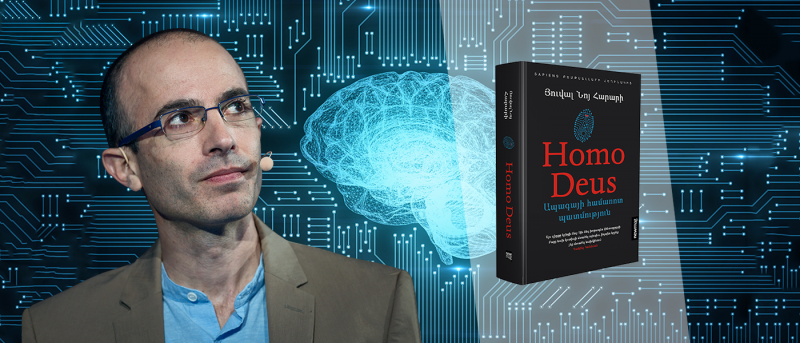Newmag published Yuval Noah Harari’s 3rd bestseller - “Homo Deus: A History of Tomorrow” (book trailer)

Newmag’s exclusive publications of 2020 are added by yet another bestseller - “Homo Deus: A History of Tomorrow” book. Homo Deus is Harari’s third bestseller after the “21 lessons for the 21st century” and “Sapiens”. One of the most influential scholars o
From politics to economics, from education to high technology, from world order to social problems, it is the combination and contradiction of these topics that make Homo Deus truly exceptional. The book explores the dreams, nightmares, and all the other features that will shape the 21st century: from overcoming death to creating artificial life. It asks the vital questions: Where do we go from here? How are we going to protect this fragile world from our own destructive powers? This is the next stage of evolution. This is Homo Deus.
Here are 10 idea-theses from Yuval Noah Harari. He suggests that these insights shape the main challenges of modern life.
1. We cannot suspend the course of history, but we can influence its direction.
2. Centuries ago human knowledge developed slowly. Nowadays, our knowledge is developing at a harmful speed. Thus, in theory, we should have understood the world much better. However, we are witnessing quite the opposite. Our knowledge brings up rapid economic, social, and political changes. Desperately trying to figure things out, we accelerate the accumulation of our knowledge, which leads to bigger shocks. As a result, we hardly succeed in making sense of the present and predicting the future.
3. Traditionally, life is now divided into two main parts: The period of learning and the period of working. Soon, this model will become completely obsolete and the only way for humans to stay in the game will be to keep learning throughout their lives.
4. If students are distracted, suffering from stress or low grades, maybe we should not blame them. Instead, we should blame the outdated methods, full classrooms, and the fast-paced life.
5. We do not become satisfied by leading a peaceful and prosperous existence. Rather, we become satisfied when reality matches our expectations. The bad news is that as conditions improve, expectations balloon.
6. People are usually afraid of change because they fear the unknown. But the single greatest constant of history is that everything changes.
7. In the past, censorship worked by blocking the flow of information. In the 21st century, censorship works by flooding people with irrelevant information. People just don't know what to pay attention to, and they often spend their time investigating and debating side issues.
8. The greatest scientific discovery was the discovery of ignorance. Once humans realized how little they knew about the world, they suddenly had a very good reason to seek new knowledge, which opened up the scientific road to progress.
9. Sapiens rule the world because only they can weave an intersubjective web of meaning: a web of laws, forces, entities, and places that exist purely in their common imagination. This web allows humans alone to organize crusades, socialist revolutions, and human rights movements.
10. Every day millions of people decide to grant their Smartphone a bit more control over their lives or try a new and more effective antidepressant drug. In pursuit of health, happiness, and power, humans will gradually change first one of their features and then another, and another, until they will no longer be human.
Read also

At Winterfest 2026, Newmag will present Henrikh Mkhitaryan’s memoir “My Life Always at the Center” (trailer)

Winterfest to feature David Georgyan’s sci-fi action novel Impedance (trailer)

At Winterfest 2026, Newmag will present Marianna Hakobyan’s “Don’t Change the Names” (trailer)

Closing and Award Ceremony of the “Sprout in Armenian – 2025” Competition at Newmag Winterfest

